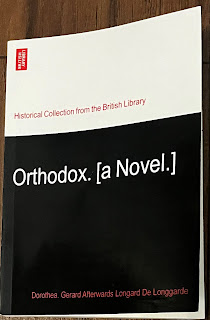Review: Orthodox, by Dorothea Gerard
by Rich Horton
I found this slim novel at the St. Louis County Book Fair. It is a British Library facsimile reprint of the first edition, from Longman's, Green and Co., in 1888. I could not resist a Victorian novel by a woman of whom I had never heard. And it is quite short (not quite 40,000 words) so it wouldn't take up much of my time anyway.Dorothea Gerard was born in Scotland in 1855. Her father was a Colonel, and maternal grandfather a somewhat notable inventor, Sir John Robison. She spent several years in Austria as a child, and upon her mother's death in 1870, moved there again to live with her sister, who had married a Polish cavalry officer. The two sisters began collaborating on novels in 1877, and had some success with Reata and The Waters of Hercules and other books, written as by "E. D. Gerard". (Emily also published non-fiction, notably a couple of books about Transylvania, and its legends, which are said to have inspired Bram Stoker when he wrote Dracula.) Dorothea also married a military man, an Austrian officer who eventually became a Major General, and was given the title "Longard de Longgarde", so that some of Dorothea's later novels were published as by "Dorothea Longard de Longgarde".
Dorothea largely stopped collaborating with her sister upon her marriage; and she was a very prolific author in her own right. Her novels were often, not surprisingly, set in Eastern Europe where she lived; though she always wrote in English. According to Wikipedia, her later books often were published by the German firm Tauchnitz, and marketed to English travelers and expatriates. She died in 1915, having lived in seclusion for many years after the death of her husband and her sister.
Her novels often seem to have been romances, apparently set among the Eastern European upper classes. She was politically conservative, but had a reputation for addressing controversial subjects, in particular prejudices across divides of class, nationality, and ethnicity, and also antisemitism. This is interesting in the context of the novel at hand.
Orthodox opens "I propose to tell the story of how my friend and comrade, Rudolph von Ortenegg, fell into the hands of the Jews ..." This did not seem terribly promising. The narrator is a 23 year old Polish officer in the Austro-Hungarian army, stationed in Poland. His friend Rudolph is the only son of an old German aristocrat, and he grew up in near isolation, so his social skills are minimal, and he has some ideas that the narrator thinks are foolish. Among these is disgust at the mistreatment of the local Jews -- which disgust the narrator finds shocking, for in his view why shouldn't one treat vermin like vermin.
Things get worse when, by chance, they encounter an astonishingly beautiful young Jewish woman, Salome. Before long Rudolph is smitten, and so too, it seems, is Salome. Against his friend's advice, Rudolph and Salome begin to plot a way for them to marry -- which of course will involve Salome converting to Catholicism. Naturally her family are aghast at the thought of this (and so too will Rudolph's father be) -- their only ally is Salome's spunky younger sister Surchen. But Rudolph manages to spirit Salome away to a nearby convent. All seems to be going well -- but Salome's father has different plans.
As I've described this, it seems nice enough, and arguably a somewhat "anti-antisemitism" book. But -- it's not, really. (Maybe it is relative to many of Gerard's contemporaries, I suppose.) Although Rudolph is quite sincere in his belief that the abusive behavior of the Polish Christians towards Jews is terrible, his primary motive for improving their lot is to convert them. And the book itself -- and its narrator -- lean in a wholly unchallenged way fully into the most offensive descriptions of the Jewish characters. They are all money grubbers, and sinisterly clever, and dishonest. Salome's sister Surchen is perhaps the most appealing character in the book -- she is as I said spunky, and quite intelligent -- but she is depicted as doing everything she does to make a bit of money. There are constant slurs as to hygiene and so on; and even the praise of some of them (for example, of Salome's beauty) is heavily tinged with Orientalist cliches. Add to that the character of Salome herself -- she is weak and really sort of a cipher -- Rudolph appears to care only about her looks. I don't know how accurate Gerard's depiction of Orthodox Jewish customs in Poland at the time is -- perhaps it is quite accurate, and as such the women seem quite oppressed -- only, I think the same could likely be said about Christian women in Poland in that era.
All in all, not a book I can recommend. I will say that Gerard could write, and with considerable wit. I dare say some of her other novels might be more palatable, but this one was -- well, offensive is the main thing.

No comments:
Post a Comment